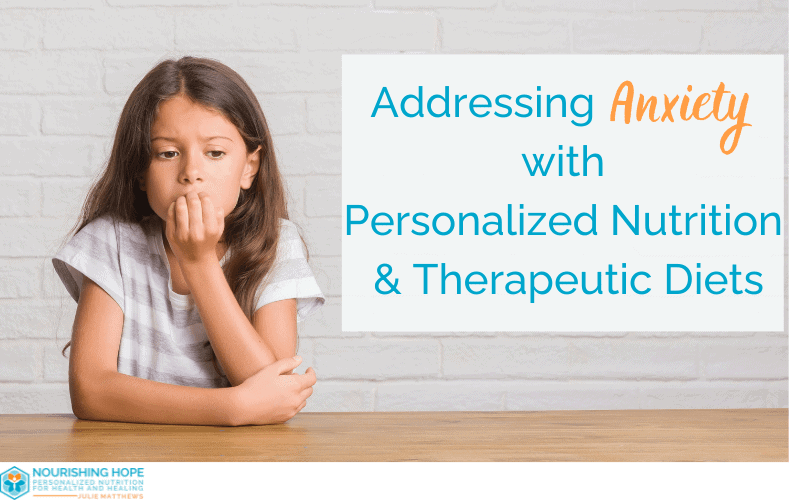
An astounding 31% of children have anxiety (and 46% of adults!) To say this is a problem would be an understatement in my opinion.
Symptoms of anxiety can be debilitating and can negatively impact the child’s home life, school performance, friendships, and ability to function at all in certain circumstances.
If you have a child with anxiety, chances are you’ve noticed your child often displays physical and behavioral signs such as restlessness, recurring headaches, withdrawing from family, or refusing to go to school.
In addition to anxiety being common in children, anxiety is particularly high in children with ADHD and autism. Researchers found that 41% of children with ADHD had anxiety and/or depression. [1] According to a research paper published in Neuropsychiatry, “up to 80% of children with ASDs experience clinically significant anxiety, with high comorbidity rates for social phobia, generalized anxiety disorder (GAD), obsessive-compulsive disorder (OCD) and separation anxiety disorder (SAD) (30, 35, 37 and 38%, respectively).” [2]
Children with ADHD and autism often find the uncertainty of their environment very stressful. Some have sensory processing disorders that can add to the problem. Shopping centers, crowds, cramped spaces, bright or fluorescent lighting, and loud noises, can overwhelm their system. This can push them into “fight or flight.” Everyday activities such as going to school and shopping can cause anxiety.
Fortunately, there are things you can do to help children and individuals with anxiety. Understanding what factors contribute to anxiety for the individual can help. One of the biggest underlying factors is biochemistry. And since food and nutrition – both good and poor – can affect biochemistry, addressing diet and nutrition can really help.
Food, Nutrients, and Biochemical Factors in Anxiety
Certainly lifestyle strategies such as stress reduction and mindfulness can help people with anxiety, it’s still important to get to the root causes or contributing factors. Understanding and addressing the biochemical roots affecting anxiety help support your children from the inside out.
1) Food reactions can contribute to anxiety
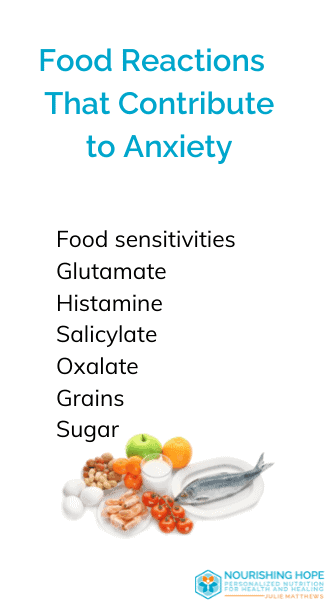 As a nutritionist, I have worked with children with ADHD and autism for 20 years and I have both seen food cause (and alleviate) symptoms of anxiety. What foods affect anxiety varies based on their underlying biochemistry and personalized nutrition needs.
As a nutritionist, I have worked with children with ADHD and autism for 20 years and I have both seen food cause (and alleviate) symptoms of anxiety. What foods affect anxiety varies based on their underlying biochemistry and personalized nutrition needs.
Food sensitivities: Inflammation, as we’ll discuss further in #2, is a common underlying factor in anxiety. And food sensitivities are a huge cause of anxiety including gluten, casein (the protein in dairy products), soy and eggs. When foods are not tolerated, they can create inflammation that can trigger anxiety.
Glutamate: Glutamate is excitatory and can stimulate the nervous system. In other words, foods containing glutamate, such as soy products, corn starch, corn syrup, and products containing carrageenan can cause anxiety.
Histamine: Foods containing a large amount of histamine and those that can trigger a release of histamine can also cause inflammation and anxiety. Histamine-rich foods include aged or fermented foods, cured meats, canned or smoked seafood, yogurt, citrus fruits, most berries, spinach, tomatoes and tomato-containing products, spices, artificial food colors, and preservatives.
Salicylates: In addition to glutamate and histamine, salicylates can also cause anxiety and a host of neurological and behavioral challenges. Examples of salicylate-rich foods include grapes, berries, apples, green bell peppers, canned mushrooms, red chili, chicory, apricots, herbs, and spices. Almonds and peanuts are also rich in salicylates.
Oxalates: Furthermore, oxalates can also not only trigger inflammation but also are known to cause anxiety.
Grains: For people with gut inflammation, grains can be particularly problematic. And once the gut is chronically inflamed, it can cause systemic inflammation.
Sugar: Sugar can contribute to anxiety. For example, poorly regulated blood sugar is a factor in anxiety, and a high sugar diet over time can lead to blood sugar dysregulation. When blood sugar drops too low, anxiety can be a symptom. Also a high sugar diet is often associated with low nutrient intake and depletion of nutrients, which can also affect mood.
2) Chronic inflammation in anxiety
Chronic systemic inflammation is an underlying factor in anxiety conditions. Inflammation is also common in ADHD, autism, depression and most other neurological conditions, as well as chronic disease.
During an inflammatory reaction, chemicals known as cytokines are produced by the body – and research shows that these cytokines can cause many neurological (and physical) symptoms including anxiety [3, 4].
Anything that triggers inflammation, such as allergens, inflammatory foods, and chemicals, can cause or exacerbate anxiety.
3) Leaky gut can exacerbate anxiety
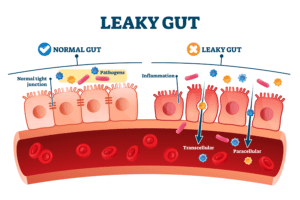 Leaky gut is a condition where the tight junctions in the intestinal lining are damaged. This creates an environment where bacteria, fragments of bacteria, and even proteins from foods that are not fully digested can “leak” into the bloodstream. It is also known as intestinal permeability. This mechanism can trigger the immune system and create systemic inflammation as the immune system becomes hyper-stimulated.
Leaky gut is a condition where the tight junctions in the intestinal lining are damaged. This creates an environment where bacteria, fragments of bacteria, and even proteins from foods that are not fully digested can “leak” into the bloodstream. It is also known as intestinal permeability. This mechanism can trigger the immune system and create systemic inflammation as the immune system becomes hyper-stimulated.
So if you are asking yourself how what goes on in the gut can impact what happens in the brain, and especially conditions like anxiety, the answer is “quite a bit!” The gut-brain axis is the mechanism by which the gut and brain communicate with one another. Inflammatory cytokines can be formed as a result of leaky gut and they can cross the blood brain barrier. When that happens, the cytokines can cause a whole host of symptoms which include anxiety, depression, headaches, and irritability [5, 6, 7].
In addition to increased inflammation, pathogens also thrive in a leaky gut. These pathogens can compound issues related to mood and increase anxiety and they also compete with good bacteria in our microbiome – which can help reduce anxiety.
Poor digestive function usually occurs with leaky gut and this results in impaired absorption of critical nutrients and amino acids that the body and brain need for good mental health and reduced anxiety.
4) Decreased methylation in anxiety
Poor methylation plays an important role in anxiety and depression and is common in ADHD, and autism. Children with ADHD and autism are at greater risk of reduced methylation. Methylation is a biochemical pathway important for many essential processes of the body. For example, methylation is essential for the production of neurotransmitters that regulate mood and anxiety such as serotonin and dopamine. To summarize, reduced methylation can cause decreased levels of serotonin (and dopamine) which can lead to cognitive and behavioral challenges such as anxiety.
5) Dopamine imbalances and anxiety
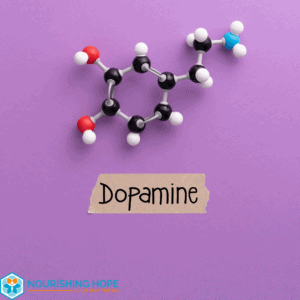 An important neurotransmitter involved in social interaction and reward behaviors is dopamine. Dopamine has been studied in regards to anxiety in autism [8] and can also be imbalanced in ADHD. Under normal circumstances, the dopamine transporter is able to clear excess dopamine from the synapse. A synapse is a gap where nerve cells can send impulses to other nerves via neurotransmitters. Genetic variations in autism disrupt this transporter.
An important neurotransmitter involved in social interaction and reward behaviors is dopamine. Dopamine has been studied in regards to anxiety in autism [8] and can also be imbalanced in ADHD. Under normal circumstances, the dopamine transporter is able to clear excess dopamine from the synapse. A synapse is a gap where nerve cells can send impulses to other nerves via neurotransmitters. Genetic variations in autism disrupt this transporter.
In addition, pathogenic bacteria can contribute to high dopamine and therefore increased anxiety. One toxin, HPHPA which stands for 3-(3-hydroxyphenyl)-3-hydroxypropionic acid, is produced by Clostridia bacteria in the gut and can be a causal factor for autism. For ABC News Dr. James Greenblatt explains that “HPHPA causes deactivation of an enzyme [Dopamine Beta-Hydroxylase] so that dopamine cannot be converted to the neurotransmitter norepinephrine.’’ This inability to convert dopamine effectively can lead to oxidative stress and a depletion of glutathione. Glutathione is a major antioxidant key in the detoxification process. [9] This reduced detoxification can also worsen anxiety.
6) Excess glutamate, hyperactivity, and anxiety
Another important neurotransmitter linked to anxiety is glutamate. It is an excitatory neurotransmitter that has been studied in regards to ADHD and autism. [10] Some children, particularly those with autism, can be deficient in an enzyme (glutamic acid decarboxylase) that breaks down glutamate and turns it into GABA. GABA (γ-Aminobutyric acid) is an amino acid that produces a calming effect through inhibition of nerve transmission in the brain. [11, 12]
In addition to being made in the body, glutamate can come from the foods we eat, either from food additives in packaged food or naturally in certain foods that are fermented and processed. Many of these food additives are derivatives of glutamate (think MSG) including autolyzed yeast extract, hydrolyzed protein, even “natural flavors.” They can cause significant reactions, including anxiety, for sensitive individuals. Reading ingredient labels is important, especially for those who react poorly to glutamate.
7) Pyroluria, nutrient deficiencies, and anxiety
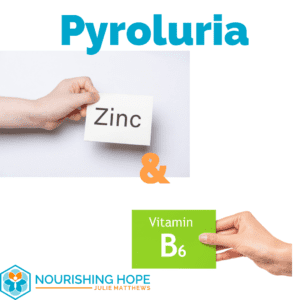 Another common biochemical factor in anxiety is a condition called pyroluria, also known as pyrrole disorder. There can be a genetic component to pyroluria and it can be induced by stress. People with pyroluria over-produce pyrrole which is a by-product of hemoglobin synthesis. This results in depletion of vitamin B6 and zinc because the excess pyrrole to bind to these nutrients. Vitamin B6 and zinc are two key nutrients linked to anxiety, sleep issues, reduced cognitive function, and problems concentrating when deficient. Individuals with ADHD, anxiety, autism, and other neurological conditions have an increased rate of pyroluria, for some conditions the rates of pyroluria are over 40%. [13]
Another common biochemical factor in anxiety is a condition called pyroluria, also known as pyrrole disorder. There can be a genetic component to pyroluria and it can be induced by stress. People with pyroluria over-produce pyrrole which is a by-product of hemoglobin synthesis. This results in depletion of vitamin B6 and zinc because the excess pyrrole to bind to these nutrients. Vitamin B6 and zinc are two key nutrients linked to anxiety, sleep issues, reduced cognitive function, and problems concentrating when deficient. Individuals with ADHD, anxiety, autism, and other neurological conditions have an increased rate of pyroluria, for some conditions the rates of pyroluria are over 40%. [13]
Diet and Nutrition Considerations
 There are a number of diet and nutrition strategies that help reduce anxiety. The key is to address the underlying factors that are contributing to the individual’s anxiety and this requires a personalized nutrition approach, or what I call BioIndividual Nutrition® (and teach practitioners in my professional training program). A BioIndividual Nutrition and therapeutic diet approach takes into account a person’s unique biochemistry, genetics, and environmental factors to determine the right nutritional intervention.
There are a number of diet and nutrition strategies that help reduce anxiety. The key is to address the underlying factors that are contributing to the individual’s anxiety and this requires a personalized nutrition approach, or what I call BioIndividual Nutrition® (and teach practitioners in my professional training program). A BioIndividual Nutrition and therapeutic diet approach takes into account a person’s unique biochemistry, genetics, and environmental factors to determine the right nutritional intervention.
Allergen-free and elimination diet
As I mentioned above, food allergies and sensitivities are common causes of inflammation. An allergen-free diet can help. Depending on your needs, a gluten-free, casein-free and soy-free diet, as well as egg-free, nut-free, and corn-free, or the elimination diet may be helpful to reduce anxiety if your body is reacting to food allergies and sensitivities.
Grain-free diets
In addition to gluten-free, diets that support the reduction of inflammation in the GI tract such as grain-free and starch-free diets can be very helpful to improve anxiety. The Paleo diet, as well as the Specific Carbohydrate Diet and GAPS diet are great grain-free diet options.
Low salicylate diet
In addition to anxiety, salicylates can cause hyperactivity, irritability, aggression, red cheeks and ears, and sensory sensitivity. Salicylates are found in berries, grapes, raisins, apples, juice, and oranges. A low salicylate diet can help with anxiety along with many behavioral and physical symptoms.
Special therapeutic diets
Additionally, when appropriate, the following special therapeutic diets can help anxiety, for individuals where underlying biochemistry may be affected or depleted: low glutamate diet, low histamine diet, or a low oxalate diet.
Additional meal strategies
For parents and caregivers looking to support a child with anxiety, here are some additional suggestions.
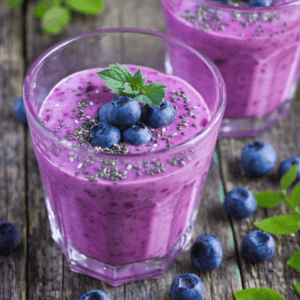 Maintain healthy blood sugar levels. Including healthy protein and fats with every meal helps to stabilize blood sugar. These can include but are not limited to: grass-fed meat, wild caught fish, poultry that is pasture-raised, organic eggs, grass-fed butter, virgin coconut oil, extra virgin olive oil, grass-fed butter or clarified ghee if tolerated. It is also important to consume as many deep colored vegetables as possible for their nutrient density.
Maintain healthy blood sugar levels. Including healthy protein and fats with every meal helps to stabilize blood sugar. These can include but are not limited to: grass-fed meat, wild caught fish, poultry that is pasture-raised, organic eggs, grass-fed butter, virgin coconut oil, extra virgin olive oil, grass-fed butter or clarified ghee if tolerated. It is also important to consume as many deep colored vegetables as possible for their nutrient density.- Avoiding foods that can cause or exacerbate inflammation like gluten and other foods I have mentioned above can help as well. Industrial seed oils such as cottonseed, sunflower, safflower, and canola should be avoided.
- Many additives in foods can also cause or make anxiety worse. Avoiding artificial sweeteners, artificial nitrites and sulfites, food dyes, potassium bromate, BHA/BHT, propylene glycol, propyl gallate, MSG, disodium inosinate and guanylate can be helpful.
- Supporting the good gut bacteria through probiotic-rich foods can be beneficial as well. However, if your child is sensitive to glutamate and/or amines, watch for any negative reactions as those sensitive can see increased anxiety as a result.
- Create the optimal diet right for your child based on their bioindividual needs. There is no one-size-fits-all diet and determining what your child needs is key to reducing anxiety.
Proper supplementation
 Adequate nutrition is important to make sure the body can make the neurotransmitters it needs, keep inflammation under control, and support the brain.
Adequate nutrition is important to make sure the body can make the neurotransmitters it needs, keep inflammation under control, and support the brain.
A multivitamin/mineral formula and essential fatty acids (as I discuss in my Nourishing Hope for Healing Kids program) are a great place to start.
Proper nutrients can play a pivotal role in reducing certain symptoms and behaviors. In fact, I was part of a 12-month study on nutritional and dietary intervention in autism. [14] Along with a healthy gluten, casein, and soy free diet, the study also included a high quality multi-vitamin/mineral formula and essential fatty acid supplement. The study found, “improvements in aberrant behaviors (ABC—Irritability, Lethargy/Social Withdrawal, Stereotypy, and Hyperactivity), sensory processing (SSP), and GI symptoms (6-GSI, PGI-2, ATEC), and Overall (PGI-2).”
By the end of the study, parents reported a statistically significant improvements in:
- Mood/happiness
- Anxiety
- Sociability
- Attention focus
- Hyperactivity
- Tantrums
- Aggression
Understanding someone’s underlying biochemistry and SNPs (single nucleotide polymorphisms) can help determine proper supplementation needs. For example: folate and B12 are important for methylation; B6, zinc, magnesium to support transsulfuration and pyroluria, and magnesium for its calming effects.
No one wants to see their child struggle, especially with something as debilitating as anxiety. There are things you can do, starting today, that can make a profound improvement. Dietary and nutritional intervention is something that families can implement, with the right guidance and support. If you are ready to get started and need a step-by-step program, I encourage you to enroll in my Nourishing Hope for Healing Kids program where you get everything you need to create the best diet for your child.
Because of the complexity of anxiety and the high rate of co-morbid conditions such as clostridia infection or PANDAs, two infectious conditions that can cause increased anxiety, or an auto-immune condition, always work with your doctor to assess for any underlying medical issues.




My child, who has anxiety, is a very picky eater. I would love to feed her all of these healthy things, but she turns up her nose. I don’t know what to do.
Hi Christina. Thanks for reaching out. You might find article I wrote on picky eating helpful. I hope so… https://nourishinghope.com/take-the-frustration-out-of-picky-eating/
Hi Julie, I’m currently trying to follow Doctor Adams’ protocol for my 13-year-old daughter who has autism. I get professional nutrition advice on a monthly basis to make sure I’m giving her the right supplement at the right time. Does she have to take vitamines/minerals along with EFA. and other supplements? Step 1 30 days of vitamines, Step 2 30 days of vit + EFA
Step 3 30 days vita+EFA+digestive enzymes.
Is that correct?
So what is the recommended diet for sufferers of an Anxiety disorder?
There is no single diet that’s always best for any one condition, in my opinion and experience. I hope this article provides some ideas to consider.
Id love to know more about leaky gut
Hi Pia. I encourage you to check out the website and even do a search of our site for leaky gut. There are lots of interesting articles and support.